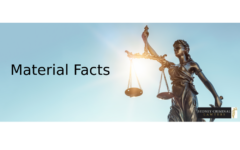Material Facts: Why Do Criminal Lawyers Use Some Facts But Not Others?

Criminal offences require proof by the prosecution that a set of essential elements (or ingredients) exist.
There are also several legal defences that may be available to those accused of crimes.
Understanding the requirements of proof and identifying relevant defences is part of the job of a specialist criminal defence lawyers.
A comprehensive knowledge of these laws will inform the formulation and execution of a defence strategy in any given case.
So, what does all this mean?
One of the things it means is that lawyers and clients may have different understandings of what is relevant to a criminal defence; in other words, whereas an experienced lawyer will prioritise certain factual material as highly relevant in the context of the case, a client may feel other information should be emphasised.
‘Material facts’ are those which are important to a particular case, and the concept of what is material and what is not can be a source of contention and frustration between lawyers and clients, particularly if the lawyer fails in sufficiently communicating the reasons that particular matters are being relied upon and others, seen as important by a client, are being set aside.
This article seeks to convey the reasons for lawyers using their knowledge of the law and making forensic decisions which focus on information which may not be seen by clients are important in their cases.
The burden and standard of proof in criminal trials
Before speaking about material facts, we need to clarify who holds the burden of proof in a criminal trial and to what standard.
The burden of proof describes who need to put forward positive evidence to prove a criminal offence. In the vast majority of criminal cases, the prosecutor holds the burden of proof to prove the case against you.
One key exception is where the accused (the defendant) wishes to rely on a formal defence (such as self-defence or a defence of mental health impairment or cognitive impairment).
When raising a defence, the accused holds the burden of proof.
The standard of proof is the degree to which a ‘decision-maker’ is convinced that an offence has occurred. A decision-maker including a magistrate in the Local Court, or a jury or judge-alone (in judge-alone trials) in a higher court such as the District or Supreme Court.
In criminal trials, the standard of proof for a prosecutor proving an offence against someone is beyond reasonable doubt.
If an accused wishes to use a formal defence, in most circumstances they must raise evidence to the standard of a ‘reasonable possibility’.
The exception is the formal defence of mental health impairment or cognitive impairment, which must be proven to the standard of ‘on the balance of probabilities’.
Once proven, it is then the burden on the prosecutor to disprove this formal defence to the standard of beyond reasonable doubt.
What are the elements of a criminal offence?
Each criminal offence can be broken down into key elements (or ingredients).
In most circumstances, each element of a criminal offence must be proven by the prosecutor beyond reasonable doubt for a person to be found guilty of an offence.
For example, to be found guilty of the offence of larceny (‘stealing’) under section 117 of the Crimes Act 1900, the prosecution will need to prove beyond reasonable doubt that you:
- Unlawfully took and carried away;
- Property belonging to someone else;
- Without the owner’s consent;
- With the intention of permanently depriving the owner of the property.
If any of these elements have not be proven beyond reasonable doubt, you cannot be found guilty of the offence.
For example, if prosecutors failed to disprove evidence that you thought the property was abandoned and only took hold of it in order to find the owner, this would mean the element of “with the intention of permanently depriving the owner of the property” was not proven, and you should be acquitted.
What are ‘material facts’?
Now that we understand both the burden and standard or proof, and the idea of criminal elements, we can now define the concept of ‘material facts’.
In short, a ‘material fact’ is any fact that can be used to prove or disprove an element of a criminal offence at trial.
For example, say Bob was charged with larceny on the basis that he walked into the front yard of his neighbour, Steve, and stole a garden gnome.
A ‘material fact’ in relation to this charge could be that when Steve found out that Bob had taken the garden gnome, he confronted him, and Bob told him “you aren’t going to get it back!” – the fact goes to the element of ‘intention to permanently deprive’ discussed above.
Another ‘material fact’ could be that Bob claims that the garden gnome belonged to him, and that it was actually Steve who committed larceny and Bob was merely taking it back. This is a material fact as it directly relates to the element that the property ‘belonged to someone else’.
In contrast, neighbourhood gossip that Steve is known to be cheating on his wife is not a material fact in this case, as it has no relevance to any of the elements of the criminal offence.
As much as Bob may wish this fact to be brought up at trial, as it is not a ‘material fact’ the lawyer is not going to do so.
One of the key reasons for this is that material facts are directly linked to the rules which govern the admissibility of evidence at trial.
Under section 56 of the Evidence Act 1995, only relevant evidence is admissible at trial. Section 55 of the Act defines ‘relevant evidence’ as:
…evidence that, if it were accepted, could rationally affect (directly or indirectly) the assessment of the probability of the existence of a fact in issue in the proceeding.
A ‘fact in issue’ is a material fact that parties disagree on. In Bob and Steve’s case, a key fact in issue would be who the gnome originally belonged to.
Some evidence that will be relevant in the criminal case against Bob will be:
- CCTV footage of Bob taking the gnome.
- Oral testimony of Steve about his confrontation with Bob.
- A receipt with Bob’s name on it, showing the purchase of the gnome.
As should be clear from above, legal proceedings are designed to concern themselves with a narrow set of facts. It’s important that when you speak with your lawyer, that you’re on the same page about what are ‘material facts’ to your case.
Going to court for a criminal matter?
If you are going to court over a criminal case, call Sydney Criminal Lawyers anytime on 9261 8881 to arrange a free first conference during which one of our experienced defence lawyers will advise you of your options and the best way forward, and fight for the optimal outcome.






